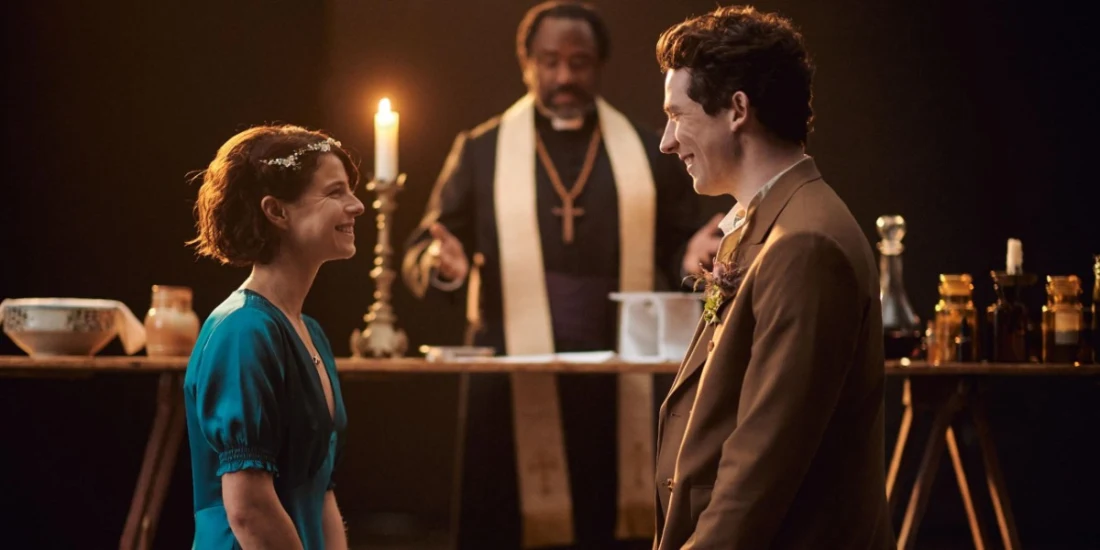National Theatre's streaming 'Romeo & Juliet' is a stunning take on the Shakespeare classic
This is more like it. Nearly two months after a disconnected, largely emotion-free Romeo and Juliet starring Sam Tutty (of Dear Evan Hansen fame), along comes the real deal: a raw and urgent new take on this potentially most overfamiliar of plays that represents lateral thinking of the highest order. In so doing, the director Simon Godwin has offered up the most impassioned version of this play imaginable, its often unwieldy length here filleted to 90-minutes as hurtling and relentless as the very journey through love and death that the play describes.
No stranger to Shakespeare at the National, Godwin originally intended to stage Shakespeare's tragedy on the Olivier stage, with stars Josh O'Connor and Jessie Buckley announced early on to star. Once the pandemic looked to be establishing itself for the long haul, many a comparable production bit the dust but not this one. A decision was instead taken to reconsider the play as a theatre-film hybrid to be filmed within the National's neighbouring Lyttelton space and shown on Sky Arts in the UK and, later, on PBS States-side. That, in turn, allowed a filmmaker novice in Godwin to augment his cast with a genuinely thrilling array of supporting players that includes such National Theatre veterans as Adrian Lester (as the mediation-minded Prince), Lucian Msamati, and the incomparable Tamsin Greig, whose Lady Capulet is here given many of her husband's lines and emerges against expectation as the cunning, manipulative villain of the piece.
Among other things, Emily Burns's extensive edit of Shakespeare's play suggests on this occasion that Lady C would quite like Juliet to marry Paris so as to be able to keep her daughter's intended in some way for herself. It helps, too, to have in Alex Mugnaioni a Paris who projects a ready sexual swagger not always evident in a role that can come off as a stuffed shirt. (In line with the fluid erotic landscape, Mercutio and Benvolio are presented as a couple who draw the ire of David Judge's fierce-eyed homophobe of a Tybalt.)
A placard shown onscreen at the end informs us that this R&J was filmed "on a single stage, over 17 days," so it makes sense that its theatrical origins exist alongside a genuine feel for the demands of celluloid. The opening shows the actors arriving in street clothes before Msamati takes authoritative command of the Prologue, returning later as a Friar Laurence whose commitment to making "short work" of the couple's impetuous path to marriage is matched by the immediacy of Godwin's vision for the piece. Meta but not cripplingly so, the film knows when to hone in on one or another character at their most raw, at other moments pulling back and allowing others to play silent witness to an emotional trajectory in which they are virtually all complicit.
Fresh from renewed acclaim for his part in The Crown, O'Connor finds an introspective quality worthy of Hamlet in a deeply felt Romeo who benefits from the cuts to the text as a whole. Whereas Romeo can often seem a self-poeticizing narcissist unworthy of Juliet, O'Connor pulls you toward Romeo as he is taken over by Juliet upon first espying her, masked, at a microphone stand mid-party, all thoughts of his previous amour, Rosaline, neatly "banished." That, in turn, turns out to be a choice word of Deborah Findlay's Nurse, here less the characteristic chatterbox and more an ally who can barely keep up with a relationship soon spinning its baleful way towards the grave. An emotional time bomb all her own, this Nurse contrasts in every way with the fearsome cunning of Grieg's Lady Capulet.
Juliet, of course, is always the choice role, and Buckley doesn't disappoint, even if purists might argue that so streamlined a version affects her part most dramatically; you may wish here and there for more of an opportunity to luxuriate in the verse. At the same time, one becomes aware more than ever of the logician in Juliet who becomes ensnared in a realm of passion beyond all reason. She and O'Connor exhibit an instant and palpable chemistry and share an ability to transmit every tremor of feeling as it is experienced, Juliet's gathering embrace of night in accord with the play's ineluctable pull towards darkness and death.
No mere play on film, the cinematographer Tim Sidell uses the capacious backstage sweep of the Lyttelton to advantage, not least the enormous loading bay doors for handling scenery and the like that threaten in context to land Shakespeare's characters in their own psychic lockdown.
You clock at every turn a collective desire to land this time-honoured story with all the power of love as it is experienced afresh and then taken away, to lastingly cruel effect. I had thought that perhaps this play wasn't for me any longer and how glad I am to be proved wrong: all it takes are the right creative hands to find in a well-worn title something newly akin to wonder.
Romeo & Juliet is on Sky Arts 5 and 8 April and on PBS in the US on 23 April. Romeo & Juliet will be screened in cinemas nationwide on 28 September.
Originally published on
